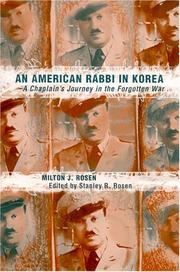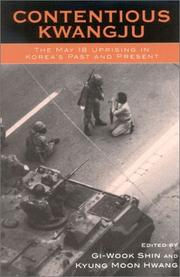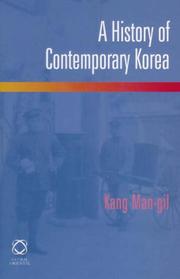| Listing 1 - 7 of 7 |
Sort by
|
Book
ISBN: 9788996295457 Year: 2010 Publisher: Seoul Iannbooks
Abstract | Keywords | Export | Availability | Bookmark
 Loading...
Loading...Choose an application
- Reference Manager
- EndNote
- RefWorks (Direct export to RefWorks)
K9549 --- K9825 --- K9801 --- K9182 --- K9180 --- Korea: International politics, law and relations -- North-South relation --- Korea: Art and antiquities -- photography --- Korea: Art and antiquities -- musea, exhibitions, collections, fairs -- Korea (South) --- Korea: History -- Korean war (1950-1953) --- Korea: History -- post World War II (1945- ) --- Exhibitions
Book
ISBN: 9788984288485 8984288489 Year: 2015 Publisher: 파주 보리
Abstract | Keywords | Export | Availability | Bookmark
 Loading...
Loading...Choose an application
- Reference Manager
- EndNote
- RefWorks (Direct export to RefWorks)
Comic books, strips, etc --- Comic books, strips, etc. --- Political prisoners --- Political prisoners. --- Torture victims --- Torture victims. --- Kim, Kŭn-t'ae, --- Korea (South). --- K9180 --- K9125.80 --- K9735 --- Korea: History -- post World War II (1945- ) --- Korea: Genealogy and biography -- biography -- modern period, postwar period (1945- ) --- Korea: Literature -- comics, cartoons

ISBN: 0817382267 9780817382261 0817314008 9780817314002 Year: 2004 Publisher: Tuscaloosa University of Alabama Press
Abstract | Keywords | Export | Availability | Bookmark
 Loading...
Loading...Choose an application
- Reference Manager
- EndNote
- RefWorks (Direct export to RefWorks)
During the height of the Korean conflict, 1950-51, Orthodox Jewish chaplain Milton J. Rosen wrote 19 feature-length articles for Der Morgen Zhornal, a Yiddish daily in New York, documenting his wartime experiences as well as those of the servicemen under his care. Rosen was among those nearly caught in the Chinese entrapment of American and Allied forces in North Korea in late 1950, and some of his most poignant writing details the trying circumstances that faced both soldiers and civilians during that time. As chaplain, Rosen was able to offer a unique account o
Korean War, 1950-1953. --- Korean War, 1950-1953 --- Military chaplains --- Rabbis --- Chaplains --- Rosen, Milton J. --- K9089.90 --- K9129.411 --- K9180 --- K9182 --- Korea: Religion -- Judaism --- Korea: Genealogy and biography of North America -- United States --- Korea: History -- post World War II (1945- ) --- Korea: History -- Korean war (1950-1953)

ISBN: 1442210370 1283616882 9786613929334 058546670X 9780585466705 9781442210370 0742519619 9780742519619 0742519627 9780742519626 9781283616881 6613929336 Year: 2003 Publisher: Lanham, Md. Rowman & Littlefield Publishers
Abstract | Keywords | Export | Availability | Bookmark
 Loading...
Loading...Choose an application
- Reference Manager
- EndNote
- RefWorks (Direct export to RefWorks)
One of the largest political protests in contemporary Korean history, the May 1980 Kwangju Uprising still exerts a profound, often contested, influence in Korean society. Through a deft combination of personal reflections and academic analysis, Contentious Kwangju offers a comprehensive examination of the multiple, shifting meanings of this seminal event and explains how the memory of Kwangju has affected Korean life from politics to culture. In keeping with the book's title, the essays offer competing interpretations of the Kw
Kwangju Uprising, Kwangju-si, Korea, 1980. --- Kwangju Incident, Kwangju-si, Korea, 1980 --- Kwangju Uprising, Korea (South), 1980 --- Kwangju-si (Korea) --- History. --- Kwangju Uprising, Kwangju-si, Korea, 1980 --- K9180 --- K9244 --- K9300.80 --- Korea: History -- post World War II (1945- ) --- Korea: Geography and local history -- Chŏlla-namdo, Chŏnra-namdo -- Kwangju --- Korea: Social sciences -- social and cultural history -- modern period, postwar period (1945- )

ISBN: 1905246056 9786611906467 1281906468 9781905246052 Year: 2005 Publisher: Folkestone Global oriental
Abstract | Keywords | Export | Availability | Bookmark
 Loading...
Loading...Choose an application
- Reference Manager
- EndNote
- RefWorks (Direct export to RefWorks)
K9160 --- K9180 --- Korea: History -- modern period (1860s-[1945]), 20th century general --- Korea: History -- post World War II (1945- ) --- Korean reunification question (1945- ) --- Mouvements de libération nationale --- Corée, Question de la réunification de la (1945- ) --- Corée du Sud --- Mouvements de libération nationale --- Corée, Question de la réunification de la (1945- ) --- Corée du Sud --- Korea (South) --- Korea --- Japan --- History. --- History --- National liberation movements --- Economic conditions --- Corée --- Economic conditions. --- Histoire --- Conditions économiques --- National liberation movements - Korea --- Korea - History - Japanese occupation, 1910-1945 --- Korea - History - Allied occupation, 1945-1948 --- Korea (South) - History --- Korea - History - 1945 --- -Korea - Economic conditions
Book
ISBN: 8988095863 9788988095867 Year: 2005 Publisher: Paju Jimoondang
Abstract | Keywords | Export | Availability | Bookmark
 Loading...
Loading...Choose an application
- Reference Manager
- EndNote
- RefWorks (Direct export to RefWorks)
Popular culture --- Korea (South) --- Politics and government --- History --- Civilization --- K9180 --- K9300.80 --- Korea: History -- post World War II (1945- ) --- Korea: Social sciences -- social and cultural history -- modern period, postwar period (1945- ) --- Taehan Minʼguk --- Han guo --- Dae Han Min Kuk --- Tae Han Min Guk --- Daehan-Minʼguk --- South Korea --- Tai Han Min Kook --- South Korean Interim Government --- S.K.I.G. --- SKIG --- Nam Chosŏn Kwado Chŏngbu --- Namjosŏn --- Namjosŏn Kwado Chŏngbu --- Republic of Korea --- Da Han Minguo --- Daehan Min-kuk --- Daikan Minkoku --- ROK --- 대한민국 --- 大韓民國 --- 대한 민국 --- Daehanminguk --- USAMGIK --- United States Army Military Government in Korea --- Popular culture - Korea (South) --- Korea (South) - Politics and government - 1988 --- -Korea (South) - History - 1988 --- -Korea (South) - Civilization - 21st century --- Ȯmnȯd Solongos --- Emu̇nedu̇ Solungus --- Solongos (South) --- Solungus (South) --- Bu̇gd Naĭramdakh Solongos Uls --- Bu̇gu̇de Nayiramdaqu Solungus Ulus --- I︠U︡zhnai︠a︡ Korei︠a︡ --- Южная Корея --- Korei︠a︡ (South) --- Корея (South) --- BNSU --- БНСУ
Book
ISBN: 9780521743532 9780511778513 9780521761161 9780511932588 0511932588 9780511931246 0511931247 0511778511 0521761166 0521743532 1107207991 0511852436 1282917420 9786612917424 0511927401 0511924860 0511929900 Year: 2010 Publisher: New York
Abstract | Keywords | Export | Availability | Bookmark
 Loading...
Loading...Choose an application
- Reference Manager
- EndNote
- RefWorks (Direct export to RefWorks)
"This book examines the changes in politics, economics, society, and foreign policy in South Korea since 1980. Starting with a brief description of its history leading up to 1980, this book deals with South Korea's transition to democracy, the stunning economic development achieved since the 1960s, the 1997 financial crisis, and the economic reforms that followed and concludes with the North Korean nuclear crisis and foreign relations with regional powers. The theoretical framework of this book addresses how democratization affected all of these dimensions of South Korea. For instance, democratization allowed for the more frequent alternation of political elites from conservative to liberal and back to conservative. These elites initiated different policies for dealing with North Korea and held different views on South Korea's role in its alliance with the United States. Consequently, ideological divides in South Korean politics became more stark and the political process more combative"--Provided by publisher.
Democratization --- 321.4 --- 323.3 --- 327.1 --- 331.30 --- KR / South Korea - Zuid Korea - Corée du Sud --- K9180 --- K9300.80 --- K9400.80 --- K9500.80 --- K9549 --- Democratic consolidation --- Democratic transition --- Political science --- New democracies --- History --- Democratie --- Politiek leven. Regeringscoalities en -crisissen --- Buitenlandse politiek. Economische sancties --- Economische toestand --- Korea: History -- post World War II (1945- ) --- Korea: Social sciences -- social and cultural history -- modern period, postwar period (1945- ) --- Korea: Economy and industry -- history -- modern period, postwar period (1945- ) --- Korea: Politics -- history -- modern period, postwar period (1945- ) --- Korea: International politics, law and relations -- North-South relation --- Korea (South) --- USAMGIK --- United States Army Military Government in Korea --- Taehan Minʼguk --- Han guo --- Dae Han Min Kuk --- Tae Han Min Guk --- Daehan-Minʼguk --- South Korea --- Tai Han Min Kook --- South Korean Interim Government --- S.K.I.G. --- SKIG --- Nam Chosŏn Kwado Chŏngbu --- Namjosŏn --- Namjosŏn Kwado Chŏngbu --- Republic of Korea --- Da Han Minguo --- Daehan Min-kuk --- Daikan Minkoku --- ROK --- 대한민국 --- 大韓民國 --- 대한 민국 --- Daehanminguk --- Economic conditions --- Politics and government --- Social Sciences --- Political Science --- Ȯmnȯd Solongos --- Emu̇nedu̇ Solungus --- Solongos (South) --- Solungus (South) --- Bu̇gd Naĭramdakh Solongos Uls --- Bu̇gu̇de Nayiramdaqu Solungus Ulus --- I︠U︡zhnai︠a︡ Korei︠a︡ --- Южная Корея --- Korei︠a︡ (South) --- Корея (South) --- BNSU --- БНСУ
| Listing 1 - 7 of 7 |
Sort by
|

 Search
Search Feedback
Feedback About UniCat
About UniCat  Help
Help News
News